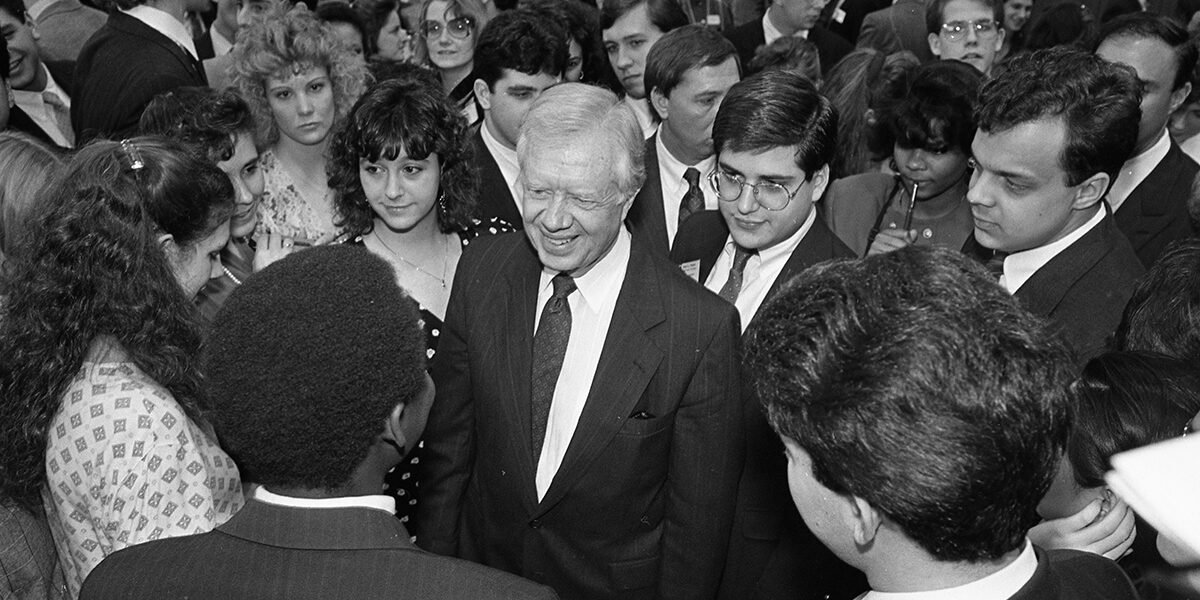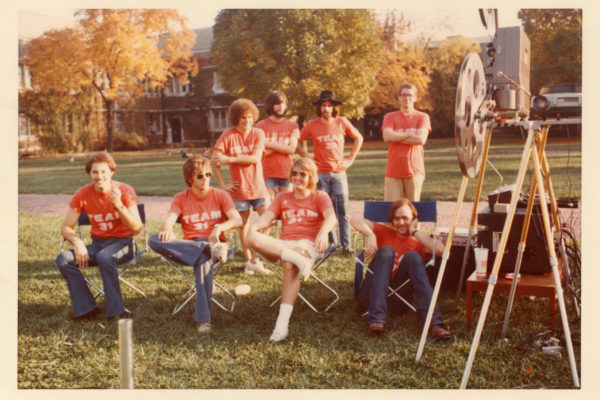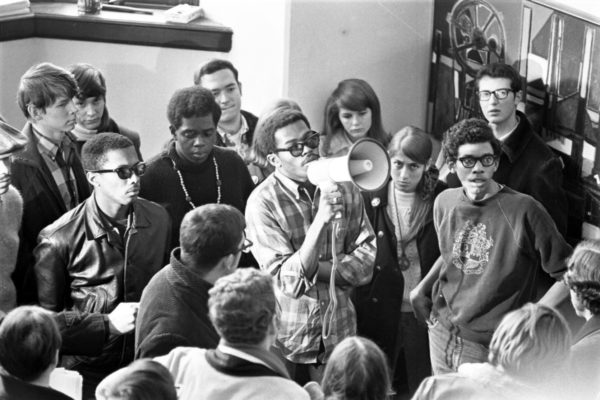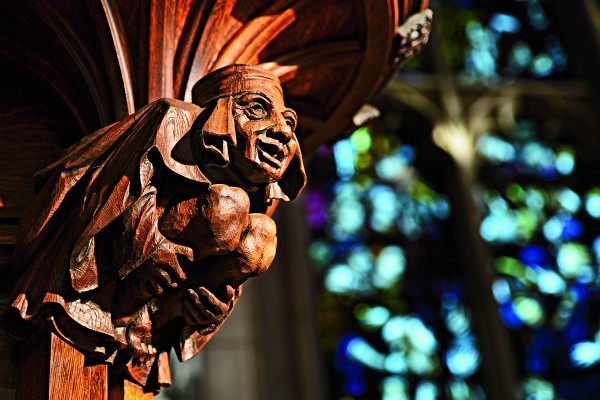Welcome to “Echoes,” where we reflect on the lives and words of inspiring figures who’ve visited Washington University through the years.
Here, we ask: What’s in a legacy? For U.S. presidents and first ladies, a legacy is often their accomplishments while holding office. But, for Jimmy and Rosalynn Carter, their legacy continued to grow after leaving the White House. Their commitment to serve others — for better living conditions and mental health — has remained central to their lives.
Jimmy and Rosalynn Carter are the oldest living president and first lady. Now in their nineties, they are also one of America’s great love stories. Both were born in Plains, Georgia, in the 1920s, and they have known each other for nearly their entire lives. Jimmy Carter’s mother even helped to deliver baby Rosalynn, on Aug. 18, 1927, in the house next door to his. Jimmy was 3 when he first met Rosalynn. Twenty years later, they would marry.
Their love has endured peanut farming, a four-year stint in the White House, and decades of humanitarian service, and on July 7, 2020, the Carters will celebrate their 74th wedding anniversary.
What better way to commemorate Presidents’ Day, and Valentine’s Day, than to look back at Jimmy and Rosalynn’s visits to WashU, and to consider how their words can still resonate with us today?
We begin with Rosalynn’s 1985 lecture, where she discusses the changing role of women, reflects on her younger years and shares her hope for the future. Then we pick up with Jimmy’s 1991 lecture, where he addresses the opportunities WashU students have to change the world.
Rosalynn Carter
My story is really the story of the changing role of women when you think about my mother and then my life and then Amy [the Carter’s daughter] and the opportunities that she has. And this change in the role of women has brought challenges for the young women of today, and young men as well. Because when the role of women changes, the role of men changes. And it’s all happened in a relatively short period of time. When I graduated from high school, the prospects for my future were to be a secretary or a school teacher or a nurse. Get married if I was lucky. That was what I wanted to do. I wanted to get married and have a family. And I wanted to be able to do something else in case I didn’t ever get married. And so I studied. I went to college. But those were the prospects for me at that time.
And at time, the women who became leaders, that were leaders — and there have always been leaders. But those women who became leaders were those who took their situation, whatever it was, and made the most of it. And rarely was it what they set out to do. My daughter-in-law Judy is a professional writer. And for several years she wrote a column for Redbook called “Making It Happen.” She had to go into communities and she was supposed to find 10 women under 35 who had really contributed something to that community. And you would think that would be quite a task. But she found dozens of young women who were leaders in the communities and the hard part was to decide which of those young women to write about. And she said everyone that she interviewed began by saying, “I’m not an expert, but.” But they were experts and they had become experts because of some situation, something in their life that had happened to them.
Many women really do things in their lives that are never publicly acknowledged. That doesn’t make their achievement any less. And my mother is a good example of that. My father died when I was 13. I was the oldest of four children. My little sister was only 4 years old. My mother had led a very sheltered life. She was the only child of parents who loved her very much. She married my father, who was 9 years older than she and had always provided and cared for her. Suddenly she found herself alone with four children to support. She did what she had to do. She went to work. She raised all of us. We all four of us turned out fairly well. She sent us all to college. When my daddy died, when all the family was called around the bedside, I was 13. And I was the oldest. And my mother and the children were there, the smaller children. And they told us that my daddy couldn’t live. And he told Mother that day — we had a small farm. And he said, “If you have to sell the farm, I want you to do it to send all the children to college so that can have the opportunity that I never had.” So she sent us all to college. She didn’t have to sell the farm. She took care of her widowed father. The year after my father died, my mother’s mother died. She took care of him until he was 95 years old while she continued to work, being a successful mother, daughter, and an expert postal clerk in our post office in Plains, Georgia. She was an achiever. And I am sure that when she was young, she never thought that she would head a one-parent household and be a working mother.
[pause]
In the Governor’s Mansion and in the White House, I have had a chance to work on issues important to women, to work with the mentally afflicted, the elderly, the physically handicapped, with children in inner cities. I learned early that a First Lady has influence. And with so many needs in our country, I tried not to waste the opportunities I had. While I had been fortunate all of my life, I have always been encouraged, even pushed, to do more sometimes than I thought I could do. First by my father, by mother’s example, and then by Jimmy, who accepted me as a real partner, whether as a wife, a mother, working in the peanut warehouse, our own special projects in the Governor’s Mansion or the White House. That’s a lot for a lifetime. And I have come to realize that as former First Lady, as I said before, the opportunities are still there. And that puts a big responsibility on me. What will I do with this influence? With these opportunities I have?
Well, that’s my story of challenge and change. And in preparing my speech for today, thinking about my mother and about my life, I was struck with how much the role of women has changed just in my lifetime. I remember in Jimmy’s first book, that he wrote in 1976, Why Not the Best?, he described the farm he grew up on and how different the farms are of today. He said that farming had changed more in the last 100 years than it had since the days of Jesus. Well, that might be a slight exaggeration. But I think the role of women has changed almost as much in the last few decades. Just look at Amy and the opportunity she has. She’s a senior in high school. She’ll graduate, she told me yesterday, in five weeks. She’s contemplating college and her future. She can do almost anything she wants to do, just as you, who are going to school here, can do almost anything you want to do. Become a leader in almost any field. Still mostly a man’s world but in almost any field. And these opportunities are wonderful for her.
But also, her generation, which is you, is faced with the challenge of figuring out how to take advantage of these opportunities and still carry out those contributions to the family and community that have always fallen to women. Being good mothers, good wives, being good neighbors. I was talking to my daughter-in-law, Judy, who lives in Evanston, and she goes to work. Well, Jack, my son, goes to work at 5 [a.m.] and gets home at 4:30 [p.m.]. She goes to work after the children go to school and gets home at 7 at night. And she said that in the daytime, there is nobody in the neighborhood. There are no wives. Wives are working. There’s nobody to be a good neighbor when something happens in the community. We’ve got to figure out what to do about that. Being leaders in social activities and communities like the PTA and other volunteer organizations, women have always been leaders in those things. The young women of today have a lot of pressure on them that women have never had before.
What that means is that times are changing for men. Men are having to recognize the value of what has traditionally been the woman’s place and share in the responsibility. The pressure is on the men, too. Since Jack and Judy, that I told you about, work all the time, they divided up their responsibilities and Jack — I’m talking out of school. I don’t know what he would do if he knew I was telling this. But Jack washes the dishes all the time. That’s his job. Sarah, who is my granddaughter, who is six years old, said to her mother a few days ago, “I sure am glad I’m a girl. I don’t have to wash dishes.” [laughter] The pressure is on the men, too. And society as a whole is going to have to change some attitudes about the so-called responsibilities of women. We’re living in a wonderful time and our future is bright. But it still depends on how well we meet the challenges that face us. In our fast-changing world, it will take the talents and contributions and leadership of every one of us, women and men alike, to achieve the kind of life all of us want for ourselves and for the generations that come after us. We’ve come a long way. We have a long way to go. Thank you very much.
Jimmy Carter
Well, an inquisitive mind is a natural product of a university environment. And this is a unique opportunity for you, at your age, to look at these concerns that we have and say to yourselves, “What can I do about it? Is it my responsibility?” You will never again have the freedom that you have now. You might say you don’t have much freedom. You’ve got to go to class and so forth, but I tell you this is a time in your life when you have utmost liberty to let your own individuality be expressed. In a few years when you finish college, you’ll get married. You might be trying to pay for a house or pay for a car. You’ll have serious obligations. You’ll have also obligations to your employers. Whether it’s IBM or in agriculture or Coca-Cola company, or whether you get a job as a schoolteacher, or work in a law firm, I guarantee you you’ll be very reluctant to do anything that will displease your boss. And here’s a chance, at this state in your lives, to say, “What are the things that do concern me?” And then say to yourself, perhaps, “Where can I get more information about this subject?” Maybe a college professor whom you trust. And then, “How can I magnify my own influence?” Maybe a group of students. Maybe, like Amy, a demonstration every now and then or a letter-writing campaign or interviews on local television or letters to your senator, your congressman, whatever. But become an expert in a particular thing that does concern you. It may be human rights. It may be housing. It may be the provision of food. It may be democracy or freedom. It may be environmental quality. It may be the control of nuclear weapons. I don’t know what it is, but when you identify something, do something about it.
And it’s not difficult. One program in which Rosalynn and I are involved doesn’t have anything to do with The Carter Center. We just volunteer to work in Habitat for Humanity, which is a program that happens to have its international headquarters just 10 miles from our home. And we teach Sunday school, and these people come in to our little Maranatha Baptist Church and listen to me teach Sunday school. But they talk about Habitat, so we got involved in it after we left the White House. Habitat is the best way I know to break down that chasm to which I referred before, between us who have things and people who don’t have them. In every university community in this nation, there are families who do not have a decent place to live. I saw a program the other day on CNN before the war started. It was about a whole row of apartments for people on the streets in New York City, perhaps the richest city in the richest country in the world. You know what the apartments were? Empty crates for stoves and refrigerators. In the stove boxes, only one person could live. Or maybe a mother and a little baby. In the refrigerator boxes, three people could live. They were very proud to have a refrigerator box in which to live, in our country. Should that be our responsibility? I think so. Habitat is not a charity organization. They don’t give away anything except love and concern and partnership. We don’t make them feel that they’re getting a free gift because we require the families who are going to live in the houses to work hundreds of hours. In Immokalee, Florida, they had to put in 2,000 hours of work on their house and other houses. In most communities, about 500 hours. But they learn a trade. And quite often, these families are the kind of people who have never had a real success in life. That’s hard for us to imagine. We’ve been successful. If you weren’t successful, you wouldn’t be here in this auditorium.
But some families never witness success. A child never sees their parents be truly successful. But to join in and build a house in which they can live with pride is a genuine achievement. And in the process, they learn a trade. Rosalynn had never hit a nail with a hammer before we started doing this. We’ve done it now for eight years. Now, she can frame up a house. She can put a sheet rock in, ceiling tile, and put down baseboards and hang doors and put in windows. She doesn’t like to work on the roof, but she puts on siding. And people learn, and once they get their new house, all of a sudden, they know how to be at least an apprentice for a carpenter. We now have Habitat organizations on 175 university campuses; I understand here, as well. Five hundred and fifty-five American communities now have Habitat projects. Thirty-three foreign nations have Habitat projects.
It’s thing to do. Last June, Rosalynn and I did eighth year. We got a lot of volunteers that want to work with us. We met on a hillside out near Tijuana, Mexico. You couldn’t see a tree or a bush or a blade of grass from where we were. Thirteen hundred of us, we lived in pup tents. We had to buy the pup tents ourselves. We lived there for a week. At the end of the week, we had completed 100 new houses. And people moved into them and are living there now. 100 houses in one week. And you don’t have to be a former president. In fact, out of the 1,300 people, only 2 of us had ever lived in the White House. The rest haven’t. But the point is, that when you get involved in something like the projects that I have described to you, it is not a sacrifice. It’s not something that interferes with your life’s work or your studies out of university. It stretches your mind. It stretches your heart. It lets you know, “I am a human being who cares about others, and the things that I do are not just making my life more restricted, but expanding what I know about God’s world and what I know about myself.”
Let me conclude by saying this. I have been, as you know, one of the presidents of our country. And presidents are different, just like you are different. All of us, though, had a common goal when we went into the Oval Office, no matter how our philosophies might have been in conflict. That is to make our nation greater. To enhance the greatness of our country. But it’s the same motivation that I presume you have. “How can I take this one life that God has given me on earth and make it a great life? One of which I can be proud. One that is fruitful.” Human beings, as we know, have the highest possible ambition of what we call agape love. Love of another person that may not repay our love. Love for another person that’s not lovable. Love of a person that’s different from us. One that might be despised. That is agape love. Sacrificial love. A nation can’t do that. When I was in the White House, I didn’t sacrifice the well-being of my own country to help others. But a nation can have a commitment to justice. To justice. To make sure that people are treated with care and concern of a compensatory nature.
If they have a handicap, help them overcome the handicap. Let them elevate their vision, their insight, their ambition, their goals, their dreams, and give them a chance to realize those dreams. That’s what a nation can do. In college, we should be committed to stretching our minds and hearts. Not just in the classroom. Not just studying pre-law or engineering or architecture. But, “How can I take care of that as a means to earn my living, with which I would very much hope I’ll enjoy, but on top of that, built upon that as a foundation, then what can I do to make my life satisfying, gratifying,” as I said earlier, “unpredictable, and adventurous?” That is what will determine the excellence of our lives. The greatness of our lives. What we are able to share with others and make their lives free of suffering and let them enjoy the liberty and the gratification, the security, that we enjoy. So in helping others, we help ourselves.
Well, I’ve gone down a gamut of things. You don’t have to look far from this very gymnasium to find people that would respond to your hand of friendship, a demonstration of concern, a shared responsibility, an element of love. How many of you in the last five years have done anything like that? How many of you know a homeless person well enough to go in their home to sit down and have a cup of coffee? Or go in their shack and have a cup of coffee? How many of you know about children who are alienated from high school and from the law and who might be tempted to take drugs or to commit crimes? How many of you feel at ease going into their homes and getting to know them? Those are the kind of things that we should explore, at least. And I would like to close by saying that a university environment is the best culture for the expansion of our minds and hearts. And in that expansion which permits others to grow, we grow much more. Thank you very much.




Comments and respectful dialogue are encouraged, but content will be moderated. Please, no personal attacks, obscenity or profanity, selling of commercial products, or endorsements of political candidates or positions. We reserve the right to remove any inappropriate comments. We also cannot address individual medical concerns or provide medical advice in this forum.